What are really long words in the English language? It’s fun to learn new words. And when thinking about which words have the most amount of letters, it can be a perplexing question in our minds. Good thing this list is here. Learn 25 of the best long words in the English dictionary!
What are long words?
Do you wonder what the longest word in the English language are? The longest word in English is the scientific name for Tintin protein present in the human body. The technical word contains 189,891 letters, which will fill up more than ten pages of any dictionary. Most dictionaries omit this name and many other long words because of space constraints.
Many of the English language’s long words contain on average more than 12-14 letters. These words are generally related to Chemistry and Medicine. Average people usually won’t use the dictionary to look up the meaning of such words, which is why they are not commonly found.
Numerous long words in the English language are technical terms, constructed, or coined words.
- Technical words serve a niche community. Highly specialized fields such as medicine have many technical terms and jargon that are only known to people serving in the medical field. For example, Pseudopseudohypoparathyroidism is a type of thyroid disorder that most people will not be familiar with.
- Constructed words are modified to make them longer words. Suffixes and prefixes are added to already existing words to make them slightly different in meaning. ‘Para’ in words paramedic and paranormal is a prefix.
- Coined words are generally found in creative mediums such as films and books. Milton for example coined the term Pandemonium for the first time in Paradise Lost.
- If you want to get an extra edge for your next scrabble match or trivia night or if you are keen on expanding your vocabulary, keep reading. In this article, we will look at some of the English language’s most fascinating long words.
25 of the longest words in the English language
Here are 25 of the longest words in the English language.
1. Pneumonoultramicroscopicsilicovolcanoconiosis
It is a 45-letter word. It is not the actual longest word in the English Language, but it is the most common long word that is included in most dictionaries, including the Merriam-Webster dictionary. It is also a technical term that most people do not commonly use. This word is used to describe a lung disease that is caused by inhalation of fine quartz and silica dust.
E.g., The doctor informed me yesterday that I have a rare lung disorder called Pneumonoultramicroscopicsilicovolcanoconiosis.
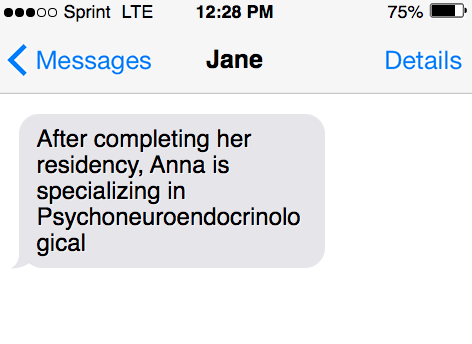
2. Hippopotomonstrosesquippedaliophobia
The 36-letter noun is one of the longest words listed in the Merriam-Webster dictionary. Ironically Hippopotomonstrosesquippedaliophobia stands for fear of long words. Psychologists use it to describe a social fear of mispronunciation of long words.
E.g., Hippopotomonstrosesquippedaliophobia is commonly found in people suffering from anxiety.

3. Supercalifragilisticexpialidocious
It is a 34-letter word that was first used in the movie Mary Poppins and is one of the most fun long words in the English language. Supercalifragilisticexpialidocious does not actually mean anything and is said only when there is nothing more to say in any situation.
E.g.: Tom panicked and shouted out supercalifragilisticexpialidocious on the school stage when he forgot what his next lines were.
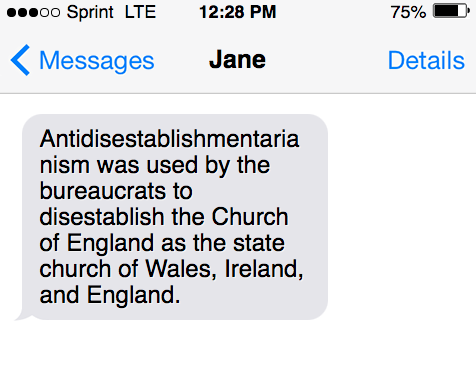
4. Pseudopseudohypoparathyroidism
According to the National Institute of Health, Pseudopseudohypoparathyroidism is a rare form of genetic disorder that is inherited. The 30-letter word is often referred to as PPHP in short and causes short hand bones, round face, and short stature. Pseudopseudohypoparathyroidism is also known to cause the hardening of soft tissues.
E.g.: Ryan the youngest sibling has inherited Pseudopseudohypoparathyroidism from his grandfather.
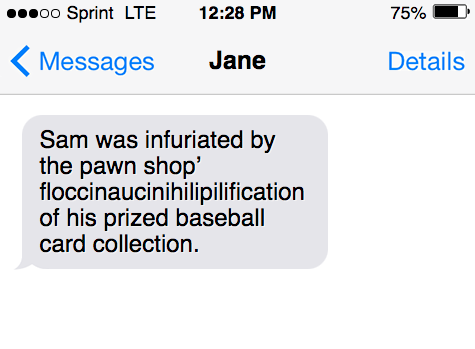
5. Pseudohypoparathyroidism
It is a 30-letter medical term that indicated a normal level of calcium and phosphorus.
E.g.: I have to get some blood work done to check for pseudohypoparathyroidism.
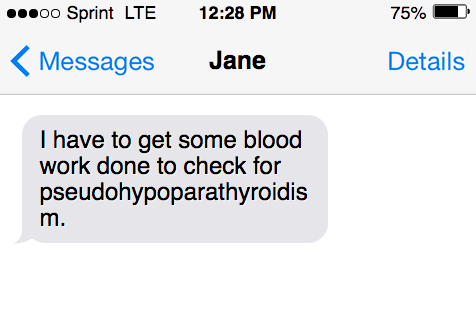
6. Floccinaucinihilipilification
The 29- letter word is used to describe the habit or act of deciding something to be worthless or meaningless. This word is rarely used by common people as it is quite a mouthful.
E.g.: Sam was infuriated by the pawn shop’ floccinaucinihilipilification of his prized baseball card collection.
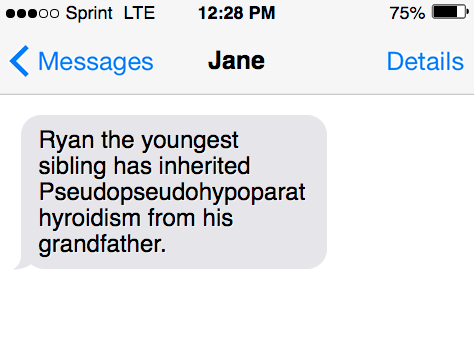
7. Antidisestablishmentarianism
Antidisestablishmentarianism refers to a political movement in Britain in the 19th century that sought to separate church and state. This word originated in16th century England when King Henry VIII established the Church of England and broke away from the Roman Catholic Church.
E.g.: Antidisestablishmentarianism was used by the bureaucrats to disestablish the Church of England as the state church of Wales, Ireland, and England.
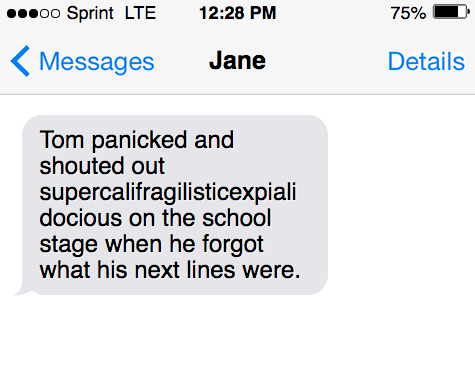
8. Hepaticocholangiogastrostomy
The medical industry coined this 28-letter word to describe a medical procedure that clears out the hepatic duct.
E.g.: The doctors wanted to perform a Hepaticocholangiogastrostomy immediately on the patient before it was too late.
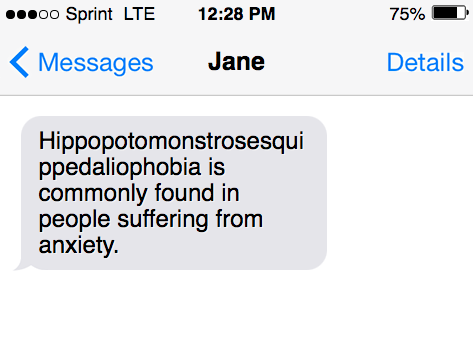
9. Psychoneuroendocrinological
This 27-letter word is used to define the study of psychology, neurology, and endocrinology, which is done to understand how hormones affect the body.
E.g.: After completing her residency, Anna is specializing in Psychoneuroendocrinological
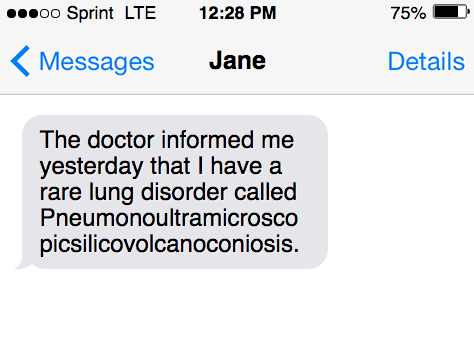
10. Radioimmunoelectrophoresis
It is a 26-letter word that medical professionals only use. Radioimmunoelectrophoresis denotes the labeling and identification of antibodies and antigen using a radioscope.
E.g.: All the 4th year medical students were assigned to conduct Radioimmunoelectrophoresis.
11. Pneumoencephalographically
Pneumoencephalographically is a 26-letter word that is the name of a critical medical procedure. During this procedure, the radiologists remove the cerebrospinal fluid from the patient’s brain and replace it with air to take clearer pictures of the brain.
E.g.: The neurosurgeon prescribed a Pneumoencephalographically before operating on the brain tumour.
12. Thyroparathyroidectomized
When a person has undergone Thyroparathyroidectomy then he is considered to be thyroparathyroidectomized. Thyroparathyroidectomy is the procedure of removing the thyroid and the parathyroid gland at the same time.
E.g. Some doctors use the word Thyroparathyroidectomized at dinner tables to prove they are smarter than everyone else.
13. Psychophysicotherapeutics
The Oxford Dictionary lists this 25-letter word as one of the longest words in the English language. It signifies a type of therapy that focuses on both the physical and mental well-being of the patient.
E.g.: The new clinic opened under Dr. Smith will greatly focus on Psychophysicotherapeutics
14. Immunoelectrophoretically
It is a 25-letter word that describes the way of separating charged molecules according to size using electricity. This is also commonly known as electrophoresis.
E.g.: Immunoelectrophoretically has helped in fastening the research process drastically.
15. Otorhinolaryngological
This 22-letter mouthful adjective is a rare word. It is used to describe the combined study of ears, nose, and throat.
E.g.: All ENT doctors specialize in Otorhinolaryngological studies.
16. Incomprehensibilities
Incomprehensibilities was recorded as the longest word that is commonly used in the 1990s. Unlike most of the other long words listed above, most people are vaguely familiar with this term. It is a 22-letter word that is closely related to the word ’incomprehensible’ which means something that cannot be comprehended or understood.
E.g.: The incomprehensibilities, of the film made the audience more confused about the plot.
17. Uncharacteristically
It is a 20-letter adverb that most English language speakers are familiar with. It is used to describe some characteristic or feature that is not typical of something or someone.
E.g. My old friend is uncharacteristically shy around my wife.
18. Buckminsterfullerene
Buckminsterfullerene is an allotrope of carbon that was discovered in 1996. In this carbon 60 atoms are found in pentagons and hexagons in a round shape. They are commonly called BuckyBalls.
E.g.: Radioactive Buckminsterfullerene is used in cancer therapy for its ability to trap different atoms.
19. Indistinguishability
Indistinguishability is a 20-letter word that is used to describe something that is identical or almost the same.
E.g.: The indistinguishability of the prop and the real one will confuse most men.
20. Compartmentalization
It is the process of dividing something into different categories or sections. Compartmentalization is a type of mental defense mechanism where conflicting feelings and thoughts are kept separated in the mind.
E.g.: Your exams are near, use the compartmentalization technique to focus on your studies and allot yourself a particular time to play.
21. Institutionalization
The 20 letters can mean two different things in a different context. It can mean the process of establishing a norm or practice. It can also mean the process of committing someone to a medical or mental institute.
E.g.: The institutionalization of Carrie Fisher, the Star Wars actress, due to Bipolar Disorder was sensational news at the time.
22. Dermatoglyphics
It is a 15-letter noun used to describe the study of markings and skin patterns on the body. The study of fingerprints and other birthmarks also falls under this category.
E.g. Knowledge of Dermatoglyphics is essential if you want to work in the criminology field.
23. Consanguineous
The word is a technical term that means descendants from the same gene pool or ancestry. Consanguineous is often used to describe intimate relationships or marriages between closely related people.
E.g.: Consanguineous children are prone to genetic disorders.
24. Psychotomimetic
Psychotomimetic is a synonym of the word hallucinogenic. The word became popular in the 1950s with the rampant availability of mind-altering drugs in the market, at the time.
E.g.: The Psychotomimetic properties of LSD are widely known in the medical community.
25. Myrmecophilous
The word is used to describe a positive relationship between ants and other species like crickets, beetles, and butterflies.
E.g.: Many plants suffer from the damage of various leaf eaters, but they are driven off from myrmecophilous plants by the ants.
There are many more long words that are present in the English language. Start by learning these words, and your vocabulary will still be far better than most people.
Inside this article
Fact checked:
Content is rigorously reviewed by a team of qualified and experienced fact checkers. Fact checkers review articles for factual accuracy, relevance, and timeliness. Learn more.
Core lessons
Glossary
- Abstract Noun
- Accusative Case
- Anecdote
- Antonym
- Active Sentence
- Adverb
- Adjective
- Allegory
- Alliteration
- Adjective Clause
- Adjective Phrase
- Ampersand
- Anastrophe
- Adverbial Clause
- Appositive Phrase
- Clause
- Compound Adjective
- Complex Sentence
- Compound Words
- Compound Predicate
- Common Noun
- Comparative Adjective
- Comparative and Superlative
- Compound Noun
- Compound Subject
- Compound Sentence
- Copular Verb
- Collective Noun
- Colloquialism
- Conciseness
- Consonance
- Conditional
- Concrete Noun
- Conjunction
- Conjugation
- Conditional Sentence
- Comma Splice
- Correlative Conjunction
- Coordinating Conjunction
- Coordinate Adjective
- Cumulative Adjective
- Dative Case
- Determiner
- Declarative Sentence
- Declarative Statement
- Direct Object Pronoun
- Direct Object
- Diction
- Diphthong
- Dangling Modifier
- Demonstrative Pronoun
- Demonstrative Adjective
- Direct Characterization
- Definite Article
- Doublespeak
- False Dilemma Fallacy
- Future Perfect Progressive
- Future Simple
- Future Perfect Continuous
- Future Perfect
- First Conditional
- Irregular Adjective
- Irregular Verb
- Imperative Sentence
- Indefinite Article
- Intransitive Verb
- Introductory Phrase
- Indefinite Pronoun
- Indirect Characterization
- Interrogative Sentence
- Intensive Pronoun
- Inanimate Object
- Indefinite Tense
- Infinitive Phrase
- Interjection
- Intensifier
- Infinitive
- Indicative Mood
- Participle
- Parallelism
- Prepositional Phrase
- Past Simple Tense
- Past Continuous Tense
- Past Perfect Tense
- Past Progressive Tense
- Present Simple Tense
- Present Perfect Tense
- Personal Pronoun
- Personification
- Persuasive Writing
- Parallel Structure
- Phrasal Verb
- Predicate Adjective
- Predicate Nominative
- Phonetic Language
- Plural Noun
- Punctuation
- Punctuation Marks
- Preposition
- Preposition of Place
- Parts of Speech
- Possessive Adjective
- Possessive Determiner
- Possessive Case
- Possessive Noun
- Proper Adjective
- Proper Noun
- Present Participle
- Prefix
- Predicate



